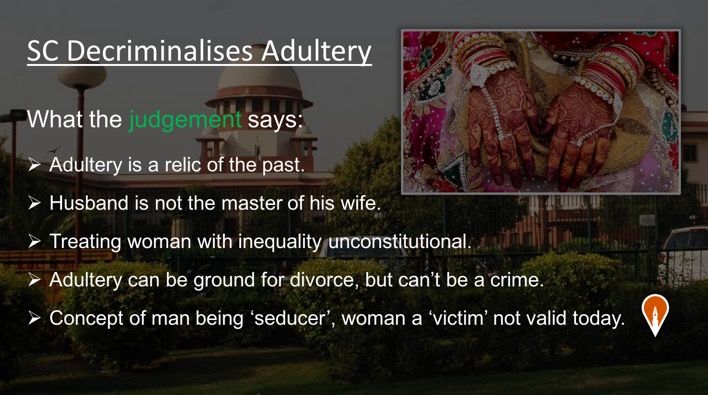
“Husband not master of wife”: SC strikes down 158-year-old British era adultery law


The Supreme Court abolished section 497 of the Indian Penal Code, terming it as unconstitutional, archaic and manifestly arbitrary
In yet another landmark judgement, the Supreme Court on Thursday decriminalised adultery after striking down a 158-year-old British era law.
According to section 497 of the Indian Penal Code, “Whoever has sexual intercourse with a person who is and whom he knows or has reason to believe to be the wife of another man, without the consent or connivance of that man, such sexual intercourse not amounting to the offence of rape, is guilty of the offence of adultery.”
Under the present adultery law, only the man could face punishment for having sexual intercourse with a married woman as it treated her as a ‘victim’ – depriving her of dignity and treating her as the property of the husband.
It was punishable by a maximum prison sentence of five years, or fine, or both.
The SC abolished section 497 of the Indian Penal Code, terming it as unconstitutional, archaic and manifestly arbitrary, with one judge saying women can’t be treated as “chattel”.
“Mere adultery can’t be a criminal offence. It is a matter of privacy. Husband is not the master of wife. Women should be treated with equality along with men,” Chief Justice Dipak Misra said.
Most countries have abolished adultery as a crime. “It shouldn’t be a criminal offence, other people are also involved in it,” Misra said, reading out the judgement, also on behalf of Justice A.M. Khanwilkar.
The bench said adultery can be treated as civil wrong for dissolution of marriage, but there can’t be any social license which destroys a home. It further said adultery can be a ground for civil wrong, a ground for divorce but not criminal offence.
Any discrimination shall invite the wrath of the Constitution, the Chief Justice said, adding that a woman cannot be asked to think about the way society desires her to do.
Justice Rohinton F. Nariman, reading out his judgement, said, “Women can’t be treated as chattel”.
Justice D.Y. Chandrachud in a concurring but separate judgment said society has two sets of morality in sexual behaviour – one for women and another for men.
Society treating women as embodiment of virtue leads to things like honour killings, he said, adding that the archaic law is against dignity, liberty and sexual autonomy guaranteed under the Constitution.
Earlier this month the apex court had decriminalised same-sex offence under Section 377 of the IPC, which was another British era law.












